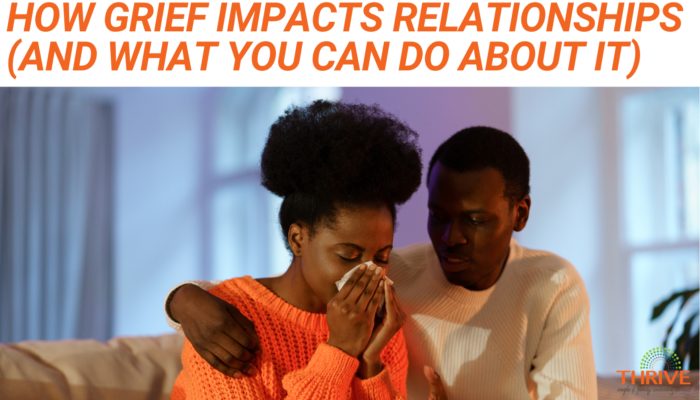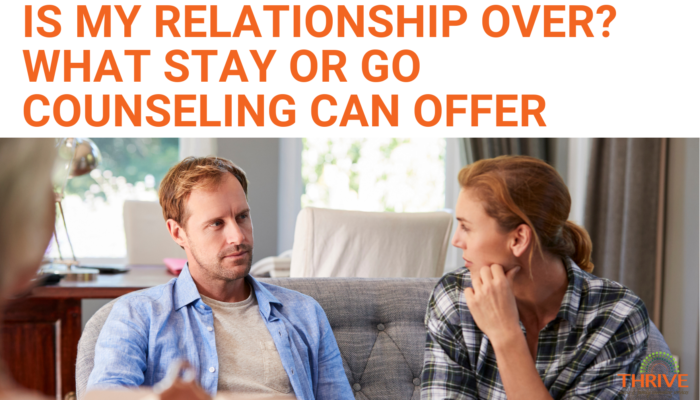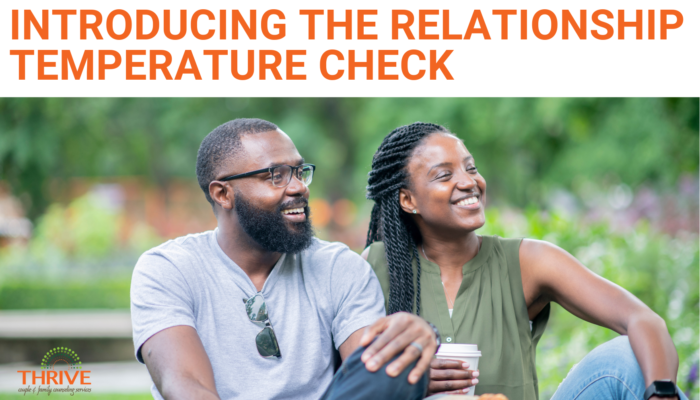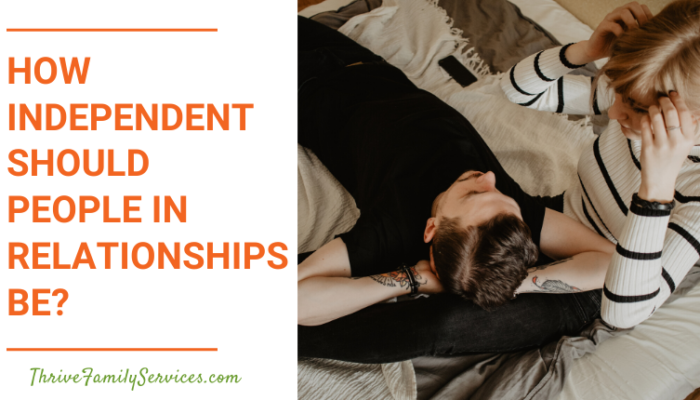Grief and loss are inevitable in our lives. Perhaps it’s due to an unexpected loss or someone you’ve been grieving as they approach their death. Whatever the reason, grief is one of the hardest parts of being human, and perhaps one of the most intense times for couples and families to navigate. When death impacts our relationships, it can feel overwhelming as someone supporting a grieving partner, as the partner grieving, or coping with both of you grieving.
We don’t talk about death enough in our society. It makes people uncomfortable. I think this is because we can all recognize on some level or another that losing someone is truly that – a loss that cannot be replaced. What do we say? What do we do? How can we help?
There are no words that can take away the pain, but we can learn to be there for one another in the depths of grief and loss. Here’s what you can do when grief comes up in your relationship.
The first step to moving through grief is acknowledging that losing someone means you are now living in a new reality.
Grief takes time. Sometimes, people pull away in the beginning of their grieving process. It’s normal to be overwhelmed or shocked after a death or loss. You can’t rush this process and should allow yourself or your partner time to feel these emotions. Know that on the other side are people who would still like to be a part of your world when you feel ready.
When you lose someone important, you can’t subject yourself to a timeline for moving through grief. It might help to change your expectations that you will ever be the same person you were before this loss. That’s because you aren’t going to be the same person – grief and loss are a major source of change. And that’s okay.
How Can I Support my Grieving Partner?
Allowing your partner time to grieve is the most vital part of the grief process. Don’t be afraid to sit in silence, or simply hold them as they cry, if they will accept your offer. Holding space is especially important in times of intense emotions like grief.
In the early days after a death, it’s hard to know what you are feeling, let alone be able to articulate what you need from someone else. If your partner is grieving and you’re not sure how to help, being there for them makes a big difference. Staying close and allowing space for their sadness and other feelings can be an incredible gift.
If your partner needs to shut down or if they need space as they grieve, remember that it’s not about you or about the relationship at that moment.
Loss can be consuming, and they need time to find stable emotional ground again. During this time, get permission to show up in the ways they may need. Remember, you know this person. This is your person. Trust your intuition in knowing how they like to be comforted.
Eventually the shock or feeling of overwhelm will pass and they will begin to make their way through the world again. This change does not mean that their grief is over and all will be well again right away. Waves of grief are normal after a loss. Grief waves will come up, often when they least expect it, and can stop them in their tracks. It can mean a lot to your partner for you to be the person they can come to and say, “It’s been a really hard day. I miss them so much.”
Don’t be afraid to ask questions about where they are in their grief, or to mention the person who’s been lost.
Knowing that we aren’t alone in our grief can be a saving grace. Remembering the person and sharing stories may feel like you are bringing their grief up when they finally feel better. Know that your partner is carrying that grief, and if you show up in it with them, they won’t be alone.
You show your partner that they’re not alone by sharing your own grief and your memories of the person who has died. It can be incredibly powerful when you’re grieving to hear how your loved one has impacted others. Knowing that your loved one lives on in the memories and tears of others can be immensely comforting in your grief.
This is the time to gather your partner’s support system.
Invite those they trust in your family and community most of all to show up and support them when they are ready. Their loved ones are probably waiting in the wings ready to be tapped in at a moment’s notice. Encourage your partner to see people when they feel ready.
During this time, have lots of flexibility for your partner to decide at the last minute which activities feel supportive and which don’t. Their needs might change day by day. Even so, try to encourage them to go out into the world again, even if it’s just for a walk around the neighborhood. Connection is what we lose in grief, and it is where we find healing and meaning again.
How Can I Let My Partner Support Me in my Grief?
When you grieve, you might pull away from your loved ones. Pulling away is one way that a lot of people cope during grief, but there are other coping skills that you can use. It can help to be around others who can attune to and be in your grief with you when you’re grieving. You may even find it difficult to be around those who aren’t grieving or who don’t know about your loss.
You lost someone and your world will never be the same again. It’s overwhelming and scary and heartbreaking. It’s okay to take time alone. On the other hand, for some it can be very hard to be alone while grieving.
Allow yourself to feel whatever comes up for you in your grief. Your partner is on the other side of this, waiting to be let back in and support you.
Maybe they’re awkwardly fumbling through what to say, or they’re walking on eggshells fearing you’ll fall apart, or maybe they’ve begun to do “too much” trying to care for your every need and whim. Remembering that all of these actions are done out of love for you is important. It can be frustrating that they aren’t where you are mentally or that their attempts to make things better don’t actually make anything better. But what makes grief better? I have yet to find that answer.
If you can, name what you want or need to your partner. Whatever it is, it’s okay. Give yourself permission to take center stage or step off the stage completely.
Many find comfort in religion or spirituality during times of grief, and if that’s the case for you, lean in. Rage at God, send a prayer to whomever, burn candles for their memory. Rituals can be great sources of comfort in times of loss.
Going to places or doing activities you associate with the person you lost can be comforting and help you feel connected to them again. Sharing stories about how they showed up in your life, good or bad, can help you move through this time.
How can Emotionally Focused Therapy Help With Grief?
If you or your partner are feeling stuck in grief, reaching out to a therapist for support may be a good step. There is no shame in reaching out for support from a therapist during these most trying times. The only way out of grief is through, and therapy can provide a safe space to process your pain together or individually.
The goal is not to cope with grief like a challenge to be managed, but to experience it, feel it, and not judge where you are.
Attachment theory, which is the foundational principle of Emotionally Focused Therapy (EFT), tells us that connection to others is how we grow and heal. Grief and losing someone we love creates agony and insecurity because we have lost that core piece of humanity – connection.
Remember though that the people we love and lost will remain with us because we have an attachment to them. Therapy can provide a place to remember that person and figure out how to keep that connection for the rest of your life.
Grief can also create a loss of self. We may have lost someone, but we may also feel we have lost a part of ourselves or like we don’t recognize who we are any longer. It can feel like you’re scrambling to find who you are again. This is natural, and therapy can help provide a place to access not only your emotions, but your sense of self again.
Something I often share with clients is that grieving the person you’ve lost is a testament to what they meant to you. They mattered. You have a right to miss them, to cry, to wallow, to lose yourself. How could you not?
Emotionally Focused Therapy teaches us there is meaning in everything. Even this grief. When you think of your loved one, send up a prayer, a bit of love, or some light out into the world on their behalf. Your new reality is still full of people who care about you, and they will be there to help you remember what you’ve lost and find peace with the “new” life you’re going to build. You just have to let them.


 Hello, I’m Maury Holliman, Marriage and Family Therapist Candidate. I’m here to support you in your goals, whether they’re about your own personal growth or desires for change in your most important relationships or a combination of both.
Hello, I’m Maury Holliman, Marriage and Family Therapist Candidate. I’m here to support you in your goals, whether they’re about your own personal growth or desires for change in your most important relationships or a combination of both.

